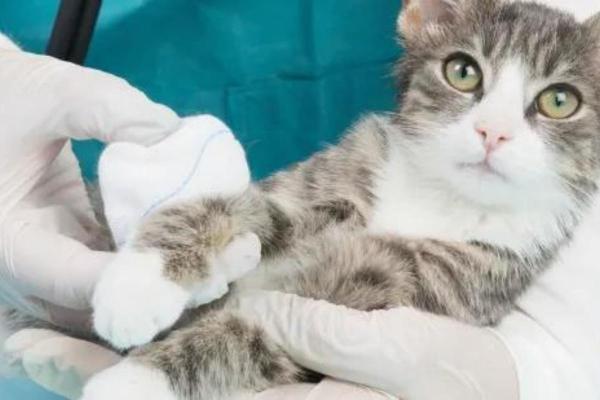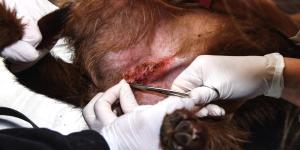Is Hydrogen Peroxide Safe for Cats?



See files for Cats
Hydrogen peroxide has been used to treat wound healing in human medicine for many years. Despite conflicting reports on its efficacy, many still use it for treating various issues and wonder if they can use the same product on their pets. Hydrogen peroxide is a compound that has been used for a long time for its oxidizing effect, its antiseptic and antimicrobial capacity, and even for its whitening properties in beauty therapies. Despite such widespread by humans, this doesn't mean it is safe for our companion animals. This is why AnimalWised asks is hydrogen peroxide safe for cats?
Can you use hydrogen peroxide on cat wounds?
Hydrogen peroxide (H2O2), also known as dihydrogen peroxide or dioxidane, is a chemical compound that is found in liquid form. It is somewhat more viscous than water (H2O) and has a penetrating and unpleasant odor.
Hydrogen peroxide is a very unstable compound that quickly decomposes into water and oxygen, releasing large amounts of heat. The uses of hydrogen peroxide largely depend on its concentration, with only low-percentage solutions sold for consumer use and higher concentrations used for various industrial purposes:
- <10% concentration: for therapeutic uses, as well as bleaching clothes and hair.
- High concentration: to whiten paper pulp, fabrics and ither textiles.
- >90% concentration: as rocket fuel, as well as to make organic chemicals and foam rubber.
In the home, this compound's uses are related to its antimicrobial, antibacterial and antiseptic properties due to its oxidizing effect at concentrations not exceeding 6%. This oxidizing effect produces OH- or hydroxyl, as well as free radicals. These compounds attack proteins and lipids of the cell membranes of microorganisms. In recent years, hydrogen peroxide use has been reduced due to the preference of products with cause less irritation.
When we look at using hydrogen peroxide for our cat, we should know that it is possible. Many caregivers have used hydrogen peroxide to treat wounds and other lesions on cats for a long time. This is because it can kill bacteria in and around the wound which can lead to infection. Although we can use hydrogen peroxide on cats, it is not ideal.
When properly applied, hydrogen peroxide will not cause intoxication in cats. However, it is a substance which is known to be relatively abrasive. For this reason, it is often better to use an alternative antiseptic product such as chlorhexidine for cats. This latter product is considered safe and effective when used topically on felines.
Essentially, hydrogen peroxide is safe for cats when used properly, but there are safer products available. If we have an emergency and only hydrogen peroxide is available, we should combine it with deionized water. This will help tp make it a less-irritating disinfectant solution for your cat's skin.
Cleaning a cat's eyes with hydrogen peroxide
Although we can say that hydrogen peroxide is safe for cats when used to treat wounds and similar abrasions, this odes not mean it should be used for other purposes.
As stated above, hydrogen peroxide has bleaching abilities. For this reason, it is used in various whitening processes, especially for industrial use. This has led many caregivers to think they can use this bleaching effect on their cat.
Certain cats have more tear staining around their eyes. This is particularly the case with brachycephalic cat breeds with a light-colored coat. Cats with brachycephaly often leak tears which cause stains to appear on the hair around their eyes. These stains are superficial and do not provide any direct risk to the cat's health.
We should never used hydrogen peroxide on our around our cat's eyes, even in low concentrations. The hydrogen peroxide is a sufficiently strong compound that it can damage the tissue of the eyeball. Either clean the areas with a suitable alternative or leave the tear stains as they are.
Cleaning a cat's ears with hydrogen peroxide
All cats will need their ears cleaned from time to time. This will help reduce the risk of otitis, bacterial infections and other issues which can affect the ears of cats. Since it has an antimicrobial effect, many wonder if they can use hydrogen peroxide to clean a cat's ears.
As with cleaning stains around the eyes, hydrogen peroxide should not be used to clean a cat's ears. The sensitive ear canal can be damaged by the abrasiveness of the solution. You can find specific cat-friendly products to clean around your cat's ears, but using gauze and water should usually be sufficient.
What happens if a cat licks hydrogen peroxide?
If we use hydrogen peroxide on a cat's wound, it is important to prevent cats from licking the area and ingesting this compound. In addition to its bad taste, this substance can cause nausea and vomiting.
The emetic (vomit-inducing) properties of hydrogen peroxide means some caregivers have used it on their dogs in cases of intoxication. This is not ideal for dogs, but it should never be applied to cats. Ingestion of sufficient amounts of hydrogen peroxide can be fatal.
You should prevent your cat from ingesting hydrogen peroxide in chemical products such as cleaning products. Although the cat will not likely try to eat it of their own accord, they can ingest some accidentally. The amount of hydrogen peroxide used on a wound site should not cause a risk of intoxication, but we should always be observant of possible symptoms such as vomiting and diarrhea in cats.

How to disinfect a cat's wound
It is important that every cat guardian knows how to disinfect a wound, especially minor superficial wounds. For deep wounds or serious lacerations, it will be necessary to take the cat to a veterinarian. They will be able to carry out debridement or removal of dead tissue from the wound, stabilize the cat's vital signs and offer sedation where necessary.
For small cuts and wounds, it is important to know first aid for cats:
- Wound cleaning: the wound area should be cleaned with sterile gauze and physiological saline. We may need to trim hair around the wound as it can predispose the cat to infections and irritations.
- Wound disinfection: the best antiseptic for cleaning a cat's wound is chlorhexidine first, although Betadine for cats is also safe. Dilute one part Betadine (povidone-iodine) with ten parts water. This is to be used with sterile gauze.
- Topical treatments: ointments with healing components can be used to speed up the process, always under the prescription of the veterinarian who has seen your cat's wound. They should be applied directly with gloves so as not to contaminate the wound.
- Protection of the wound: an Elizabethan collar prevents the cat from licking the wound by making it difficult for them to move their neck. Preventing the wound from being licked is essential in the proper healing of a wound. A cat's tongue is very rough and it can damage the tissue as it heals. This can delay the healing process and promote secondary bacterial infection. Sometimes the cat's wound will be wrapped up instead of using an E-collar for cats. Take a look at our video below for more information.
- Use of antibiotics: in case of infected wounds. The antibiotic we use needs to be effective for the bacteria present, meaning we need a prescription from a veterinarian.
Now you know how to treat and clean a cat's wounds, you may find our article on why my cat's wound isn't healing useful.

This article is purely informative. AnimalWised does not have the authority to prescribe any veterinary treatment or create a diagnosis. We invite you to take your pet to the veterinarian if they are suffering from any condition or pain.
If you want to read similar articles to Is Hydrogen Peroxide Safe for Cats?, we recommend you visit our First aid category.
- G. Perez. (2018). First aid for cats. Arcopress, S. L.







